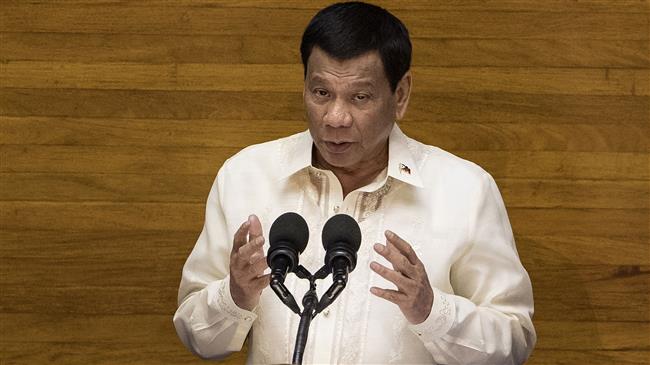Philippine leader approves autonomy law for Muslim region


Philippine President Rodrigo Duterte has approved a law permitting the autonomy-seeking Muslim community in the south of the country to start a legal procedure to gain autonomy.
Duterte signed the Bangsamoro Organic Law on Thursday after a visit to a southern city, according to his spokesman Harry Roque.
The long-awaited law was approved by the government after decades of peace talks between autonomy seekers and the government were stalled causing frustration, and most notably resulting in the devastating occupation of Marawi City last year by a Daesh-linked splinter militant group.
Ebrahim Murad, chairman of the separatist Moro Islamic Liberation Front (MILF), said he was confident the law would help bring splinter separatist groups back into the political fold and eliminate prospects of any incidents like Marawi.

The Bangsamoro Organic Law, which has broad public backing, makes it difficult for foreign extremists to form alliances and win support, Murad told reporters.
“All these splinter groups are a result of the frustration with the peace process. The moment the small groups no longer accept the foreign elements, they can no longer come (to the Philippines).”
The Bangsamoro area includes part of the Philippines’ second-largest island of Mindanao, and a chain of dozens of small islands to the west notorious for piracy and banditry.
An estimated five million Muslims live in the region, which has the predominantly Catholic nation’s lowest levels of employment, income, education and economic development.
The momentum behind the autonomy process was “a long-awaited dream coming true,” said Jesus Dureza, Duterte’s top peace adviser.
The new law gives the new entity, Bangsamoro Autonomous Region in Muslim Mindanao, political and economic powers that successive governments have promised separatists, in order to halt the conflict that has killed about 120,000 people and displaced 2 million.
Mindanao remains under martial law until the end of this year, to allow security forces to halt a regrouping by a pro-Daesh alliance that held Marawi through five months of air and ground assaults.

The MILF has condemned the Daesh-linked extremist militants and its fighters have been helping government troops to disrupt their activities.
Next comes an October referendum, where a positive result would let Duterte appoint an 80-member panel to set up a parliamentary system loosely patterned on Malaysia’s federal government.
MILF leaders have welcomed the Bangsamoro law, even though all their demands were not met.
“We will not stop there, we will continue to engage government until amendments are made in the law later to get what we really wanted,” Mohaqher Iqbal, the MILF chief negotiator, told the media after the final text was agreed.
Iqbal said the rebels were expected to decommission 30 percent of their 40,000 weapons after the referendum.
Many of the government’s powers will be devolved by 2022, but the central government will still keep control of security.







